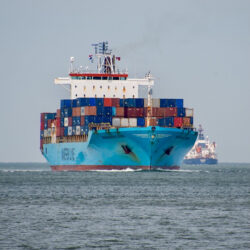Retailers issue ‘historic tender’ for zero-emission container shipping

A group of international retailers united in the Zero Emission Maritime Buyers Alliance (ZEMBA) have invited container shipping lines to submit bids for the zero-emission shipping of 600,000 TEUs. The retailers include companies such as Amazon, Ikea, Levi Strauss & Co, Meta, Nike, Philips and Unilever. They described the joint tender as “historic”.
ZEMBA was formed in March this year by The Aspen Institute, Amazon, Patagonia and Tchibo with the aim of fast-tracking the commercial deployment of zero-emissions shipping services at scale. The first member to join was the Inter Ikea Group, which has since been followed by around 20 other leading companies.
The retailers’ request for proposal (RFP) is seeking bids for shipping services, from individual carriers or consortia, that achieve at least a 90% reduction in greenhouse gas emissions compared to traditional fossil fuels. The shipping companies must also have sufficient capacity to transport 600,000 TEUs across a distance of approximately 11,000km over three years.
215,000 cars off the road
By issuing this tender, ZEMBA aims to save almost one million metric tonnes of carbon emissions. That is the equivalent of taking 215,000 cars off the road, according to the group. Ingrid Irigoyen, Director of the Aspen Institute Shipping Decarbonisation Initiative, describes it as “a historic step in the fight against climate change”.
“Shipping has long been a major contributor to climate change and air pollution. Attempts to move away from fossil fuels have encountered significant obstacles, including a perceived lack of customer demand in the context of cargo transport, which has stifled investment and the scalability of potential solutions,” she says.
Aggressive objective
“By now setting an aggressive objective, a group of leaders are changing the conversation. And this is just the beginning. We expect this movement among climate-leading companies to grow rapidly. This will allow us to drive economies of scale, innovation and a wave of confidence among investors and companies,” she adds.
The first delivery of shipping services on new, cleaner fuels is expected in 2025.










